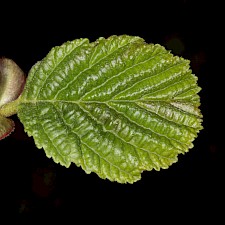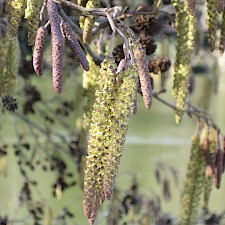Alder
Botanical Name
Alnus glutinosa
Family
Betulaceae (birch)
Also known as
European alder, black alder
Where is it originally from?
Eurasia, North Africa
What does it look like?
Deciduous tree (<15 m high), with dark brown, fissured bark, often with two or three main trunks growing together. Purple or grey leaf buds turn into leathery, oblong toothed leaves (5-10 cm), with raised veins on the underside and rounded tips. Young leaves and buds are sticky with a resinous gum. Both male and female flowers appear on the same tree before leaves emerge. Narrow yellow male catkins (2-6 cm long) made up of many flowers dangle from branches, while small, round, green female catkins are grouped (3-8) on each stalk. Female catkins, once pollinated by male catkins via wind, develop into woody green cones (1-2cm long) that ripen to brown before releasing small (3mm), flat, waxy seeds (nutlets) that float on water.
Are there any similar species?
Why is it weedy?
Fruits prolifically, and forms thickets by suckering, forming dense stands in wet areas.
How does it spread?
Wind, gravity and water. Suckers from the main plant.
What damage does it do?
Invades wet natural areas, forming dense stands and crowding out other species.
Which habitats is it likely to invade?
Moist or waterlogged sites and along rivers.
What can I do to get rid of it?
1. Dig or pull out small plants (all year round).







